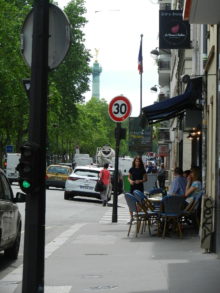What are the dates of the course?
Friday, December 28, 2018, through Thursday, January 10, 2019. Normal travel dates for this course: departure from the U.S. on December 27 (arrival on December 28) and departure from Paris on January 11.
Where will we be staying in Paris?
Students will be housed in apartments in a modern hotel a few blocks north of the Place de la Bastille and a 10-minute walk to the Victor Hugo Museum in the Place des Vosges. Single and double rooms come equipped with kitchenettes, bath, ironing board and iron. Breakfast is included. Self-serve laundry facilities are available on-site for an additional fee. The apartment/kitchen situation enables you to save on meals if you choose to shop and eat in your apa rtment. A Casino supermarket is five minutes away. Our classes will take place in a comfortable hotel meeting room with projector and screen. Here is the hotel lobby:
rtment. A Casino supermarket is five minutes away. Our classes will take place in a comfortable hotel meeting room with projector and screen. Here is the hotel lobby:
and a view of the July Column at the Place de la Bastille, from the front of the hotel: 
Do we travel to Paris on our own or as a group?
You make your own travel arrangements.
How much does the course cost?
The total estimated cost to participate in this two-week program, including hotel, required museum entrance fees, Navigo pass for unlimited public transportation in Paris, as well as estimated airfare and meals: $5,750 for in-state students; $6,071 for out-of-state students. For more details, see the Budget Sheet from UVA Education Abroad.
Do I need to know French?
No, you need not know French, as the course will be taught entirely in English. Several of our French guest speakers speak fluent English. For those who do not, Marva will summarize in English the remarks they make in French.
Who is the instructor?
University of Virginia Professor Emerita and internationally-recognized Victor Hugo expert Marva Barnett has designed this course to give participants special insights into Paris through the eyes and experiences of the nineteenth-century poet, novelist, playwright, artist, social commentator and legislator who was Victor Hugo. She brings numerous experiences to the course:
- insights from her year as a Fulbright Teaching Assistant in a Paris suburb as well as her many recent stays in Paris
- the knowledge of Hugo’s life and ideas she gained through writing Victor Hugo on Things That Matter and her current book project about what Hugo tells us in his epic Les Misérables about living lives of love and conscience
- understanding of teaching and learning from her decades of teaching UVA courses about Hugo’s work and life and from her quarter century as founding director of UVA’s Center for Teaching Excellence
What will the daily schedule look like?
Mondays through Saturdays we will typically begin the day with an hour-long class in which we debrief the preceding day’s activities, discuss the assigned readings and introduce the site(s) we will visit that morning. In the afternoon/evening, you will have time to read the material for the following days—unless you choose to read ahead before the course begins—and to explore Paris on your own. As part of the course, in fact, you will be asked to be a flâneur / flâneuse, that is, to stroll with no specific destination and to observe.
For about half our meeting days, we will have the pleasure of welcoming each of these renowned Hugo scholars and curators of Hugo’s manuscripts, letters and artwork:
- Maison de Victor Hugo/Victor Hugo Museum Director, Gérard Audinet
- Hugo expert Gérard Pouchain, agrégé de l’université, docteur ès lettres
- Hugo biographer and CNRS faculty member Jean-Marc Hovasse
- Sorbonne professor Florence Naugrette
- Maison de Victor Hugo/ Victor Hugo Museum manuscript specialist Michèle Bertaux
- Bibliothèque nationale de France manuscript curator Thomas Cazentre
- Hugo expert Arnaud Laster, universitaire
On Sundays there will be no class, but you will have reading and writing assignments for the course and time to visit an optional site or two. A list of optional sites on the syllabus will help introduce you to Paris possibilities, but you are free to visit whatever sites you like.
We plan to spend one evening attending a French play with English supertitles—one of Hugo’s, if we’re lucky!
What will the workload be?
In this course focused on discussion (with occasional informational lecturing), evaluation of your accomplishments will depend on the following work, which is designed to help you accomplish the course goals and recognize your progress:
- preparing required reading (on average, 25-40 pages/class) and occasional viewing
- contributing to discussions during both our daily “classroom” meetings and site visits
- introducing colleagues to ONE course reading or an optional site you have visited by giving a 5-minute introduction and critical appreciation and leading a brief discussion during class
- writing regular online Forum blog posts to develop and demonstrate your critical-thinking skills and responding to others’ posts (a total of 6 blog posts at 1-1.5 pages each)
- analyzing in a final portfolio what you learned about Victor Hugo and yourself. With this overarching, final course assignment, you have the opportunity to analyze and present your evolving thinking about what you learned about Victor Hugo, Paris and yourself, including Hugo’s contributions to French/world literature and Paris, Hugo’s relevance in the world today, and connections between your and his ideas and thoughts about Paris. To do so, you will collect the writing, artwork and ideas from the course that have meant the most to you and write a reflective essay (5-6 pages long) about your collection.
Is the syllabus available?
Click here for the Draft Syllabus. Students accepted into the course will have access to the detailed syllabus with complete reading list and site visits.
Who is the course designed for?
Adult students in the University of Virginia Bachelor of Interdisciplinary Studies (BIS) Program who are eager to explore Paris through Victor Hugo’s life and work. UVA undergraduate students, students and other colleges/universities, and adults interested in this course are also encouraged to apply.
Important note for UVA undergraduate students: Students in any college at UVA except the College of Arts & Sciences (CLAS) may receive degree credit for courses offered through the BIS Program. CLAS students, however, cannot receive College degree credit for courses offered through the BIS Program.
I’m not a UVA student—may I apply to this course?
Yes, you are welcome to apply to be admitted to “Victor Hugo’s Paris,” whether you are a full-time student at another university/college—or someone who is not currently a student but who holds a BA/BS or advanced degree. In either case, to be considered for the course, complete the on-line program application here: https://educationabroad.virginia.edu/how-to-apply.
If you are a full-time student at another university/college, you will find eligibility and requirements at http://educationabroad.virginia.edu/non-uva-students.
If you are not currently a student and hold a BA/BS or advanced degree, you would submit as part of the application process the data necessary in order to be admitted as a visiting, non-degree graduate student if you are admitted to the course and if you accept that offer (including a transcript and a letter of recommendation).
Individuals admitted as visiting, non-degree students committed to the course will be subject to all UVA academic and non-academic policies and procedures. These include the Standards of Conduct, Honor, and financial rules. These students will also enjoy and carry all the associated rights, privileges, and responsibilities.
How do I apply?
The APPLICATION DEADLINE is October 1, 2018. To apply, go to the UVA Education Abroad site. ants are notified of their status by mid-October. See important information and requirements at https://educationabroad.virginia.edu/how-to-apply.
Other questions?
For specific questions about the course itself, email Marva: marva@virginia.edu.
For questions about the application process, contact Martha Sadler, Education Abroad Advisor: ms2aw@virginia.edu; (434) 924-9159
